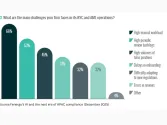
Asia's formalwear retailers urged to revisit market strategies
As employees remain working from home, retailers could consider focusing on comfort, analysts have advised.
With work-from-home continuing to be a precautionary measure in 2021 to safeguard employees from the pandemic, formalwear retail brands in Asia-Pacific need to revisit their strategies to operate and compete in the market, according to a report from GlobalData.
Formalwear retail brands saw a sharp growth in the recent past with the emergence of countries such as India, Singapore and China as major global corporate hubs and growing influence of Western suit culture.
However, with several countries across the region witnessing another wave, coers will continue the nsumtransition to more casual workwear even while returning to the office. Still, some may still be expected to wear full suit attire, particularly those in client-facing roles.
“In the long-term, workwear will only partly recover the lost demand, as most businesses are expected to adopt the hybrid working, with a mix of time spent at home and in the office post-pandemic, therefore the demand for workwear will not reach the pre-COVID-19 level,” GlobalData’s retail analyst Ankita Roy said.
As shoppers are likely to opt for new styles once they return to offices, Roy recommended for formalwear retailers to focus on building hidden comfort through more breathable fabrics and stretch waistlines.
In particular, smart casual workwear had already grown in popularity before the pandemic with an unusual growth in demand during the pandemic. For instance, in India, retailers such as Myntra, Lifestyle and Peter England are offering a combination of formal and casual workwear products, new work-from-home collections, to leverage the demand for the products.
“Post pandemic, comfort will remain the key to most of the APAC consumers and work outfits will continue to integrate more casual elements. To match the trend, formalwear retailers must adapt or risk having a redundant product offer,” Roy said.
As part of the overall customer experience when buying formalwear, visiting a store, selecting fabric and getting a tailored fitting, formed an integral part of the process before the pandemic.
However, with stores experiencing temporary closures and purchasing shifting online, formalwear retailers will need to find new ways to interact with consumers and still meet the high standards for a perfect fit with formal styles, GlobalData noted.
Roy noted that online penetration will remain higher post-pandemic as consumers have become more accustomed to this shopping channel due to the convenience it provides.
“As a result, brands must invest in their digital propositions, incorporating aspects such as digital tailoring services and engaging with customers through video calls to virtually view their existing formalwear wardrobes and recommend new styles that could fill in the gaps,” Roy added.



















 Advertise
Advertise






